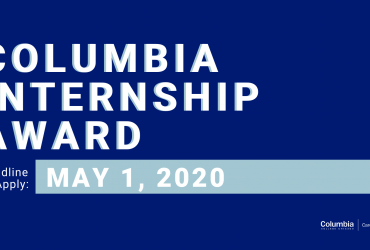by Robin Mosley-Vaughan, Career Development Advisor

Clem Onojeghuo @clemono2 (unsplash)
There’s a lot that’s probably going on in your mind as you get closer to applying for jobs especially during these times. I’ve sat down with hundreds of students, and every one of them has had some variation of the question “How do I get a job in my field?” There is no one answer to that because students are as vast as the jobs that exist (and many don’t exist yet), so you’ll have to allow yourself some space to grow because applying for a job is a full-time job. But there are some great and simple steps you’ll need to help you get through this process successfully. Let’s look at 5 tips on how to start your job search.
Use career services to your advantage now

John Schnobrich @johnschno (unsplash)
Whether you are a freshman or on your way to out to the professional world, utilize the Career Center. Here at Columbia, you only have one year after graduation to get our services, so use us as much as you can. We can help you with resumes, cover letters, interviewing, creating a portfolio, internship support, and more. To make the best of your time during your appointment, be prepared with questions! Have a way to direct what you want from us, otherwise, you might not get the help you need in the way that you want. If you don’t have any specific questions, still contact us and we will help guide you through the process.
Get as many experiential learning experiences as you can

LinkedIn Sales Navigator @linkedinsalesnavigator (unsplash)
I wasn’t much of a student who thought that internships, volunteer experiences, and projects were important, but I am telling you that they are important for every employer. Let’s say there were two candidates, student A and student B. Student A had one internship and two projects, and student B had three internships, one volunteer experience and two projects. If it came down to it, the sheer number of experiences student B had will serve their job search better simply because they have more experiences to show on their resume, to write about in a cover letter, and talk about in a detailed way for an employer.
Quality and quantity matter for experiential learning experiences. You aren’t simply competing with Columbia students; you’re competing with every student and every professional as well. So, get diverse experiences that teaches you both the hard and soft skills for the job that you want. If you’re a senior and you don’t have a lot of time left, pick up some serious volunteer experiences using the advanced level skills you’ve gained from your classes and projects, but also know that you can still apply for internships even after graduation for some companies.
Create a job search document

Kelly Sikkema @kellysikkema (unsplash)
Before you get to your actual job search, you need to get ahead of the game and create a job search document that will track what you’ve done thus far in your job search. Some of you will need to apply for over 50+ jobs before you find one that responds and is something you truly like. That said, having a document that tracks where you’ve applied, and the responses will help you. When you’re applying to a lot of positions, you don’t want to be on the opposite end of a phone with a hiring manager asking you about a job you don’t even remember applying for weeks ago.
Research for the job you want, not the field

Jason Leung @ninjason (unsplash)
There are so many students who say, “I want to be a X.” X for you could be a writer, director, graphic designer and more. The problem is that many students only know of a few companies and you only search in the same space. What if I told you that you could be a graphic designer at a studio, a magazine, a music company, a financial company and more? Search for the job and not necessarily the field. Look for keywords that lead to different titles for the work you want to do because not every job title will be titled the same. What you should do to find keywords for job titles is to start with the word you do know. Type in “writer” in Indeed, LinkedIn, or Glassdoor, and you’ll get a list of jobs that provide a multitude of titles to choose from. Write them down and keep them as the keywords to your job search.
Tailor every resume to every job

Romain Vignes @rvignes (unsplash)
The hardest part for students (and even professionals) is realizing that putting everything on your resume doesn’t show that you are qualified for the position. What does show that, however, is putting together experiences on your resume that connects to the position. Having a lot of experiential learning experiences can help with that because you will now have many opportunities to choose from that could highlight your qualifications. How do you tailor your resume? Look at what they ask for in the description section of the posting. If they are asking for a certain quality or skill, make sure the position you’ve done shows this effectively. You’ll also need to make sure it’s clear you’ve done this kind of skill in a bullet point (not paragraphs) on your resume. Finally, you’ll need to be mindful of Applicant Tracking Systems (ATS), they will make or break your application process. But more on that in my next post.
If you want to get in touch with us, make an appointment on colum.joinhandshake.com, or email us at careercenter@colum.edu.





